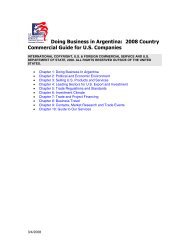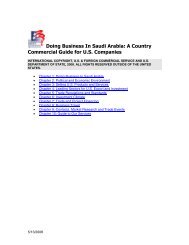Doing Business In (Insert Country Name Here) - BNA
Doing Business In (Insert Country Name Here) - BNA
Doing Business In (Insert Country Name Here) - BNA
Create successful ePaper yourself
Turn your PDF publications into a flip-book with our unique Google optimized e-Paper software.
The subject has been also been covered in the section about Standards (see below).<br />
U.S. firms entering the French market are strongly advised to examine EU as well as<br />
French laws. Each European Union country is integrating the rulings of the EU into its<br />
national legislation. As much legislation regarding labeling is still in the developmental<br />
stage, EU labeling regulations and standards need to be carefully monitored.<br />
Manufacturers should be mindful that, in addition to the EU’s mandatory and voluntary<br />
schemes, French voluntary labeling schemes might still apply. These schemes may be<br />
highly appreciated by consumers, and thus, become unavoidable for marketing<br />
purposes. Labeling in France serves an increasingly informational and even promotional<br />
role. Labels often act as "silent salespeople," especially due to the recent growth of<br />
large retail stores offering little sales assistance.<br />
Manufacturers are advised to take note that all labels require metric units, although dual<br />
labeling is also acceptable until end of December 2009. The use of language on labels<br />
has been the subject of a Commission Communication, which encourages multilingual<br />
information, while preserving the freedom of Member States to require the use of the<br />
language of the country of consumption.<br />
The EU adopted legislation in 1992 (revised in 2000) to distinguish environmentally<br />
friendly production through a voluntary labeling scheme called the Eco-label. The<br />
symbol, a green flower, is a voluntary mark. The Eco-label is awarded to producers who<br />
can show that their product is less harmful to the environment than similar such<br />
products. This “green label” also aims to encourage consumers to buy green products.<br />
However, the scheme does not establish ecological standards that all manufacturers are<br />
required to meet to place products on the market. Products without the EU Eco-label<br />
can still enter the EU as long as they meet the existing health, safety, and environmental<br />
standards and regulations.<br />
There are concerns in the United States that the EU Eco-labeling program may become<br />
a de facto trade barrier; may not enhance environmental protection in a transparent,<br />
scientifically sound manner; may not be open to meaningful participation by U.S. firms;<br />
and may discriminate unfairly against U.S. business. The EU Eco-label is a costly<br />
scheme (up to EUR 1,300 for registration and up to EUR 25,000/ year for the use of the<br />
label, with a reduction of 25 percent for SMEs) and has therefore not been widely used<br />
so far. However, the Eco-label can be a good marketing tool and, given the growing<br />
demand for green products in Europe, it is likely that the Eco-label will become more and<br />
more a reference for green consumers.<br />
Basic Labeling Requirements:<br />
Though many labeling regulations are sector-related, the following information is<br />
generally required for all categories of products:<br />
Origin: Cite country of origin.<br />
Language: Labels must be written in French. French or international law must have<br />
authorized any foreign words or abbreviations. The writing must be clear and nonpromotional.<br />
2/15/2008 <strong>Country</strong> Commercial Guide for France 78<br />
INTERNATIONAL COPYRIGHT, U.S. & FOREIGN COMMERCIAL SERVICE AND U.S. DEPARTMENT OF STATE,<br />
© 2007. ALL RIGHTS RESERVED OUTSIDE OF THE UNITED STATES.












